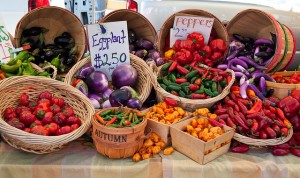How Can We Fix Our Broken Food System? Start With the Base of the Supply Chain
Aug 7 2014
Originally published on TriplePundit
Social equity in the food supply chain was a strong thread running through the annual Sustainable Agriculture & Food Systems Funders forum this June in Denver. If we’re going to fix our broken food system so that it delivers healthy food to the whole population while enabling farmers to make a decent living, we’ll need new models and alternatives across the entire supply chain.
The most potentially transformative enterprises, however, often face the greatest funding hurdles. The forum’s theme, “Stronger Together,” reflects a growing recognition that collaborative funding strategies involving investors, foundations and communities are essential to getting these types of enterprises off the ground.
We know this approach can work. A growing number of social enterprises supported by what we call ‘integrated capital’ are successfully addressing problems related to food production, processing, aggregation and distribution in ways that contribute to social equity and agricultural sustainability. They’re flying under the media radar, but they’re worth examining as models for the field.
Real progress on tough challenges
Problems at the beginning of the supply chain — dwindling agricultural land, fewer farmers, lack of access to production facilities, and missing distribution links between metropolitan areas and their surrounding farms — are among the most difficult to solve. But several enterprises we’ve worked with in these areas have made real progress.
Viva Farms: Cultivating new farmers
In terms of food production, the biggest hurdles are affordable access to land near consumers and the need to encourage and train more people as farmers (the average age of farmers in the U.S. is 57). Viva Farms, an incubator program operating on 33 acres in Washington state’s Skagit Valley, addresses both issues, working with a mix of highly skilled migrant farm workers who have no access to land or capital and young, educated urbanites who have little agricultural experience. Viva Farms gives these new farmers training in sustainable farming practices, small land parcels with shared infrastructure and marketing support.
The goal is to transition the farmers from incubator to farm ownership with secure long-term prospects. Once farmers establish stable agricultural enterprises at the incubator, Viva Farms helps them relocate to new land and expand operations via a loan fund that provides affordable start-up and growth capital. Start-up costs for beginning farmers in the Valley can range from $30,000 to $500,000; with Viva Farms’ support, farmers’ costs drop to less than $5,000.
The program, launched in 2009, has provided training to about 250 people and launched 15 farm businesses that produce on more than 70 acres.
The primary challenges for the Viva Farms model are maintaining and expanding capital for land purchases and national immigration policy. Migrant farm workers who have the skills and desire to be the next generation of farmers often are hindered by their immigration status. Even if they personally have legal status, an immediate family member may not, and the ever-present possibility of deportation makes it difficult to invest for the long term.
Don Shaffer is President & CEO at RSF Social Finance
